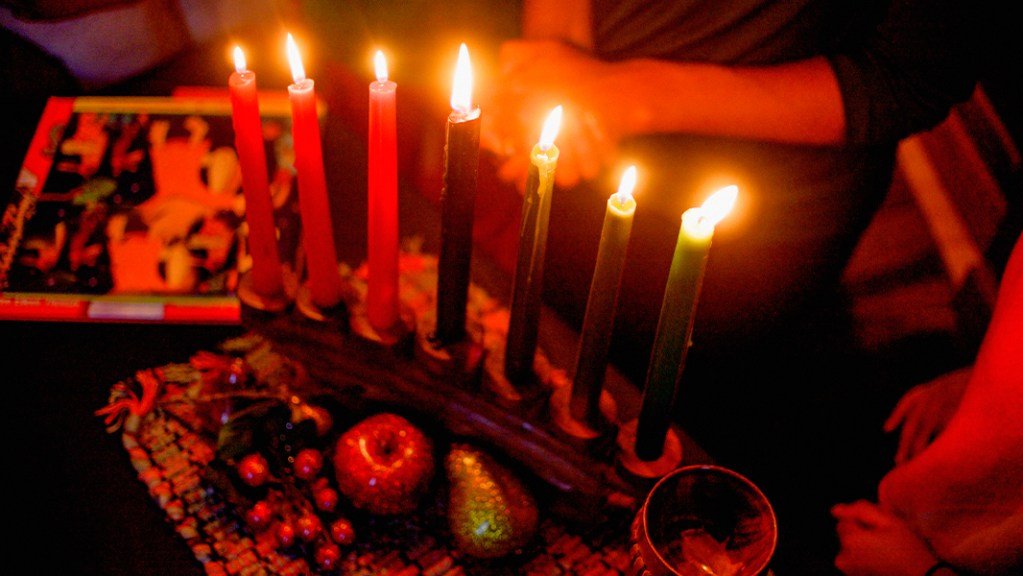

CALIFORNIA, Md. — Kwanzaa, a weeklong celebration honoring African heritage and values, was founded in 1966 by Dr. Maulana Karenga, a professor and activist. He created the holiday during the height of the Black Power Movement as a means for African Americans to reconnect with their cultural roots and affirm community values. The name “Kwanzaa” is derived from the Swahili phrase matunda ya kwanza, meaning “first fruits,” reflecting traditional African harvest celebrations.
A Celebration of Culture and Values
Kwanzaa begins on Dec. 26 and ends on Jan. 1, culminating in a communal feast known as Karamu on Dec. 31. Each day, families light one of seven candles on the kinara (candle holder) to reflect on the holiday’s core principles, known as the Nguzo Saba (Seven Principles): Umoja (Unity), Kujichagulia (Self-Determination), Ujima (Collective Work and Responsibility), Ujamaa (Cooperative Economics), Nia (Purpose), Kuumba (Creativity), and Imani (Faith).
For many, Kwanzaa serves as a time of reflection, cultural expression, and community bonding. It is celebrated with storytelling, music, dance, and the exchange of handmade gifts on the last day. Each family celebrates Kwanzaa in its own way. Some simply take it as a time to honor their heritage, while others celebrate all seven days with various activities.
Who Celebrates Kwanzaa?
Although it originated in the United States, Kwanzaa is celebrated by people of African descent worldwide, particularly in the Caribbean and other countries with large numbers of African descendants. Participation varies; for some, it is an alternative to mainstream holiday traditions, while others observe it alongside Christmas or New Year celebrations.
“Kwanzaa is a time for families and communities to come together to remember the past and to celebrate African American culture,” stated on the National Museum of African American History & Culture website.
Controversies Surrounding Kwanzaa
Despite its cultural significance, Kwanzaa has been controversial since its inception. Critics have raised concerns over the holiday’s modern origins, its founder, and its relevance today.
Dr. Maulana Karenga’s past, including a 1970s conviction for felony assault and false imprisonment, has led some to question his character and the legitimacy of Kwanzaa. Others perceive Kwanzaa as a “manufactured” holiday, given its creation in 1966, and dismiss it as less authentic than long-established traditions.
The holiday’s timing, beginning the day after Christmas, has also fueled misconceptions that it seeks to replace Christmas. However, Kwanzaa is secular and often observed alongside other traditions.
Former Presidents Bill Clinton, George W. Bush, and Barack Obama all released statements commemorating the holiday. In 1997, the U.S. Postal Service began issuing Kwanzaa stamps, although it is not recognized as a federal holiday.
“Kwanzaa is not a religious holiday, but a cultural one with an inherent spiritual quality,” Maulana Karenga, a Black nationalist, stated on History.com, “Thus, Africans of all faiths can and do celebrate Kwanzaa, i.e. Muslims, Christians, Black Hebrews, Jews, Buddhists, Baha’i and Hindus, as well as those who follow the ancient traditions of Maat, Yoruba, Ashanti, Dogon, etc.”
While millions celebrate Kwanzaa, it is not universally embraced within the African American community as some feel it does not resonate with their personal experiences.
Celebrating Kwanzaa in Maryland
While exact figures are difficult to determine, local community centers and faith groups in Maryland have reported a growing interest in Kwanzaa events. For example, the Howard County Office of Human Rights & Equity hosts an annual Kwanzaa Celebration at the Harriet Tubman Cultural Center, which has currently sold out of tickets for this year’s event.
Other Kwanzaa events happening in Maryland include the Annual Kwanzaa Celebration at Have de Grace Colored School Museum and Cultural Center, the Annual Kwanzaa Celebration & African Naming Ceremony at Laurel Partnership Activity Hall, and the Kwanzaa Tales event at Anne Arundel County Public Library.
A Tradition of Unity and Reflection
Millions observe Kwanzaa nationwide, with celebrations tailored to individual and community needs. As Maryland becomes increasingly diverse, local interest in the holiday continues to grow, reflecting a desire to honor and preserve African heritage.
Local libraries and cultural organizations often provide resources and host programs for those interested in learning more or participating in Kwanzaa events.
For more information on Kwanzaa, visit the National Museum of African American History & Culture website.
Contact our news desk at news@thebaynet.com
The post What Is Kwanzaa And Who Celebrates It? appeared first on The BayNet.
Author: funeralcosts.com
https://thebaynet.com/what-is-kwanzaa-and-who-celebrates-it/
